初二英语(外研版)-M10U3 Language in use (2)-3学习任务单
2019年外研版八年级上册英语教案:M10Unit3Languageinuse

2.思维品质:培养学生运用英语进行逻辑思维和批判性思维,学会分析、比较和总结过去事件。
3.文化意识:通过学习本单元内容,增强学生对中外文化差异的认识,培养跨文化交际意识。
4.学习能力:激发学生的自主学习兴趣,培养合作学习、探究学习的能力,提高学生的英语学习策略。
3.成果分享:每个小组将选择一名代表来分享他们的讨论成果。
(五)总结回顾(用时5分钟)
今天的学习,我们了解了过去进行时和一般过去时的基本概念、重要性和应用。同时,我们也通过实践活动和小组讨论加深了对这两个时态的理解。我希望大家能够掌握这些知识点,并在日常生活中灵活运用。最后,如果有任何疑问或不明白的地方,请随时向我提问。
3.重点难点解析:在讲授过程中,我会特别强调过去进行时和一般过去时的区别和用法这两个重点。对于难点部分,我会通过举例和比较来帮助大家理解。
(三)实践活动(用时10分钟)
1.分组讨论:学生们将分成若干小组,每组讨论一个与过去进行时和一般过去时相关的实际问题。
2.实验操作:为了加深理解,我们将进行一个简单的角色扮演活动。这个活动将演示如何在实际场景中运用这两个时态。
四、教学流程
(一)导入新课(用时5分钟)
同学们,今天我们将要学习的是M10 Unit 3 Language in use这一章节。在开始之前,我想先问大家一个问题:“你们在日常生活中是否遇到过需要描述过去正在进行的动作或事件的情况?”(如:昨天你在做作业时,妈妈在做饭。)这个问题与我们将要学习的内容密切相关。通过这个问题,我希望能够引起大家的兴趣和好奇心,让我们一同探索过去进行时和一般过去时的奥秘。
4.教学过程中,我注意到部分学生在记忆不规则动词过去式时感到困难。为了帮助学生更好地掌握这部分内容,我计划在下一节课中增加一些有趣的记忆方法,如编写顺口溜、进行联想记忆等。
2019秋外研版八年级英语上册教案:Module10Unit3 Languageinuse

3.成果展示:每个小组将向全班展示他们的讨论成果和实验操作的结果。
(四)学生小组讨论(用时10分钟)
1.讨论主题:学生将围绕“环境问题在实际生活中的解决方案”这一主题展开讨论。他们将被鼓励提出自己的观点和想法,并与其他小组成员进行交流。
(3)听力技巧:培养学生从听力材料中获取关键信息的能力,关注环境问题的现状和解决方法。
举例:在听力练习中,指导学生关注涉及环境问题的关键词,如“pollution”, “solution”, “protect”等。
(4)口语表达:通过角色扮演和讨论,让学生运用所学知识描述环境问题及其解决方案。
举例:在角色扮演活动中,鼓励学生使用所学词汇和语法结构,如“ What can we do to protectthe environment?”来展开讨论。
1.复习和巩固Module 10前两个单元的重点词汇和语法,如:have an effect on, in the long run, protect...from, be harmful to等。
2.完成教材中的Activity 1,让学生通过小组讨论,运用所学词汇和语法描述不同环境问题及解决办法。
3.学习和掌握教材中的Activity 2,通过听力练习,提高学生获取信息、分析问题和解决问题的能力。
4.运用教材中的Activity 3,让学生进行角色扮演,模拟实际情景,运用所学知识进行交流和讨论。
5.通过教材中的Activity 4,让学生进行写作练习,巩固所学词汇和语法,提高写作能力。
二、核心素养目标
(3)听力理解:学生在听力过程中容易受到生词和复杂句子结构的影响,难以抓住关键信息。
外研版英语八年级上册M3Unit3《Languageinuse》教学设计

外研版英语八年级上册M3 Unit 3《Language in use》教学设计一. 教材分析《外研版英语八年级上册》M3 Unit 3《Language in use》主要围绕着语言的使用展开,让学生学会在不同的情境下使用恰当的语言。
本节课的主要内容包括日常用语、电话用语和电子邮件用语等。
通过本节课的学习,学生能够掌握这些语言表达方式,并在日常生活中灵活运用。
二. 学情分析八年级的学生已经具备了一定的英语基础,对于日常的交流和表达已经没有太大的问题。
但是,他们在电话和电子邮件等方面的语言表达可能会显得有些欠缺。
因此,在教学过程中,教师需要针对这些方面进行重点的引导和训练。
三. 教学目标1.知识目标:学生能够掌握日常用语、电话用语和电子邮件用语等表达方式。
2.能力目标:学生能够在日常生活中灵活运用这些语言表达方式。
3.情感目标:学生能够提高对英语学习的兴趣,增强自信心。
四. 教学重难点1.重点:让学生掌握日常用语、电话用语和电子邮件用语等表达方式。
2.难点:让学生能够在日常生活中灵活运用这些语言表达方式。
五. 教学方法1.情境教学法:通过设定不同的情境,让学生在实际环境中学习和运用语言。
2.交互式教学法:教师与学生、学生与学生之间的互动,提高学生的参与度和积极性。
3.任务型教学法:通过完成不同的任务,让学生在实践中学习和运用语言。
六. 教学准备1.教师准备:备好相关的教学材料和课件,准备好不同的情境道具。
2.学生准备:提前让学生预习相关的内容,准备好进行课堂互动。
七. 教学过程1.导入(5分钟)教师通过设置一个日常交流的情境,如在商店购物,引出本节课的主题——日常用语。
2.呈现(10分钟)教师通过课件展示不同的日常用语,如问候、介绍、道别等,并让学生进行实际的操作练习。
3.操练(10分钟)教师设置一个电话交流的情境,让学生模拟电话对话,练习电话用语。
4.巩固(10分钟)教师通过一个电子邮件的交流情境,让学生练习电子邮件用语,巩固本节课所学的内容。
初二英语(外研版)-M10U3 Language in use (2)

Time After university After about two
years
Now
Things he did/he has done
got a job with a local radio station in a small town
started working for a national radio station
Step 2 Write each section.
Step 3 Do a school radio programme. Try to record it if possd for them for four years
present music shows youngest
four
work hard love your job
Around the worldThe clockwork radio
New words
A clockwork radio:
He was once a student of the school, now he is a successful person in radio.
Yes,it was.
He always works hard and loves his job.
Complete the table.
Time
a clever radio that works without batteries or electricity. 发条式收音机
Read again and match the two parts of the sentences.
radio to
Module task:
Step 1 Decide what to include in your school radio programme.
八年级英语上册 Module 10 Unit 3 Language in use课件 (新版)外研版

1 It is sunny now, but let’s take an umbrella…(rain later) 2 It is not always warm in February, and…(cool)
because it might/may/will probably rain later. 2. It is not always warm in February, and
sometime it may/might be very cold. 3.It is usually hot and sunny, so we
D. must enjoy 4.-Excuse me. Is this the right way to the Summer
Palace? -Sorry, I am not sure. But it ___ be. A. might B. will C. must D. can
第六页,共29页。
Language practice
morning, but the sun will come out in the afternoon.
第二十页,共29页。
Around the world
The Amazon Rainforest
The Amazon Rainforest is one of the wettest places in the world. It has more than 200 cm of rain every year. The Amazon Rainforest has more different animals and plants than any other place in
外研版八年级上册英语 Module 10 UNIT3 Language in use
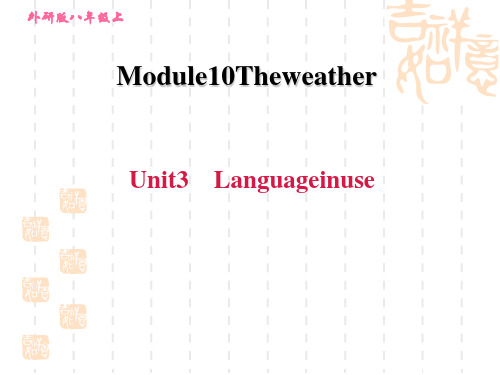
Module10Theweather
Unit3 Languageinuse
提示:点击 进入习题
语法通关练
答案呈现
1 may/might 6 B 11 maybe/isprobably
2 probably
7 B 12 willprobably
3 may/might 8 C 13 may/might
may/might
4.—____M__a_y_Icomeroundinthemorning? —Ofcourse.
5. We’regoingonholidaysoon, _________nextmonth. probably
二、单项选择。
6. [中考·青岛] Asmiddleschoolstudents, B
1. Whata_________ (sun) daytoday! Let’shaveapicnic. sunny
2. Youmustbe_________ (joke). 3. Look! Lindaisj_o_k_i_n_g____ (skate) inthepark.
4. Therearealotofdsakrakt_in_g_______ (cloud) inthesky. Ithinkitisgoingtorainsoon. clouds
we______followthepublicruleswhereverwego.
A. wouldB. shouldC. mightD. could
7. [中考·淮安]—Willyoustayherefordinnerwithus? —Sorry, I_____. Mymotheriswaitingformeathome.
might
初二【英语(外研版)】M10 Unit 3 Language in use 教学设计
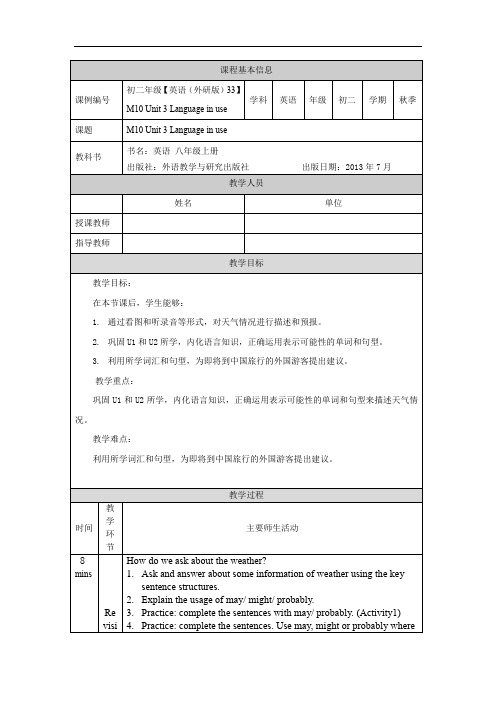
课例编号
初二年级【英语(外研版)33】M10 Unit 3 Language in use
学科
英语
年级
初二
学期
秋季
课题
M10 Unit 3 Language in use
教科书
书名:英语 八年级上册
出版社:外语教学与研究出版社 出版日期:2013年7月
教学人员
姓名
单位
授课教师
指导教师
教学目标
2.What might the weather be like?
3.What clothes should I bring?
4.Where can I stay?
5.What can I do?
How do we give advice on the best time to visit some place?
教学难点:
利用所学词汇和句型,为即将到中国旅行的外国游客提出建议。
教学过程
时间
教学环节
主要师生活动
8
mins
6
mins
4
mins
5 mins
Revision
ListeningBiblioteka ReadingWriting
Homework
How do we ask about the weather?
1.Ask and answer about some informationof weatherusing the key sentence structures.
3.After you answer the question, look at the map and make a weather forecast.
外研版八年级英语上册:Module 10 Unit 3 Language in use 学案
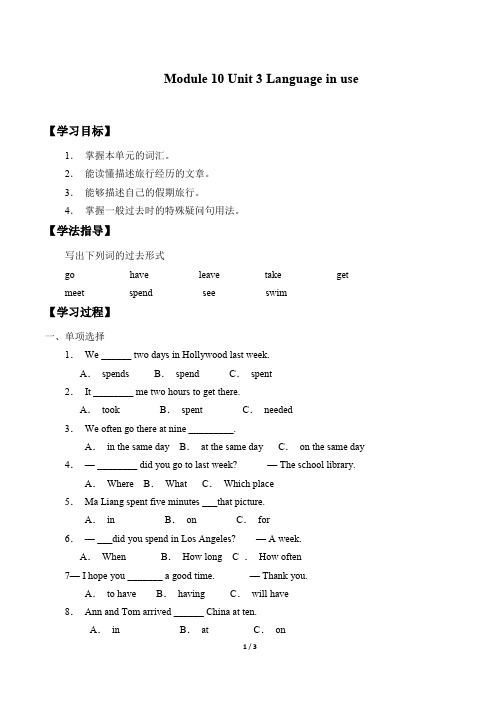
Module 10 Unit 3 Language in use【学习目标】1.掌握本单元的词汇。
2.能读懂描述旅行经历的文章。
3.能够描述自己的假期旅行。
4.掌握一般过去时的特殊疑问句用法。
【学法指导】写出下列词的过去形式go have leave take getmeet spend see swim【学习过程】一、单项选择1.We ______ two days in Hollywood last week.A.spends B.spend C.spent2.It ________ me two hours to get there.A.took B.spent C.needed3.We often go there at nine _________.A.in the same day B.at the same day C.on the same day 4.— ________ did you go to last week? — The school library.A.Where B.What C.Which place5.Ma Liang spent five minutes ___that picture.A.in B.on C.for6.— ___did you spend in Los Angeles? — A week.A.When B.How long C .How often7— I hope you _______ a good time. — Thank you.A.to have B.having C.will have8.Ann and Tom arrived ______ China at ten.A.in B.at C.on9.The traffic accident happened on ___.A. last morningB. Saturday morningC. yesterday10.---I hear the Greens are going to Taiyuan. ----Let’s ________ them.A.say goodbye to B.tell hello to C.say hello to二、句型转换:1.My mother liked the film very much.(就划线部分提问)______ ______ your mother ______the film?2.He didn’t go to school yesterday because he was ill. (就划线部分提问)_______ ________ he go to school yesterday?3.They had some meat and vegetables for lunch yesterday. (就划线部分提问)______ ______ they ______ for lunch yesterday?4.The boy is drawing a beautiful picture at the moment. (用yesterday来改写句子) The boy _________ a beautiful picture __________.5.The little girl picked some flowers in the forest last weekend.(划线提问)____________ The little girl __________ in the forest last weekend?6There were some beautiful flowers 3 years ago. (一般疑问句)__________ There __________ beautiful flowers 3 years ago?7.She read 3 books last week.(划线提问)_____ Books ________ she ________ last week?三、用括号中所给词的正确形式填空1.She went to school without _________ (have) breakfast this morning.2.The girl wanted ____________ (sit) on the chair.3.It’s not easy for her ____________ (play) basketball well.4.They are looking forward to ___________ (have) a long holiday.5.We begin ____________ (have) lessons at 8:00 in the morning.6.He ______________ (return) to Beijing in 3 weeks.7.Please be quiet, the baby _____________ (sleep).8.The old man was very tired and he fell __________ (sleep) very soon.9.There ____________ (be not) a garden in the past.10.She _______________ (not do) his homework last night.。
外研版八年级英语上册教案:Module10Unit3Languageinuse
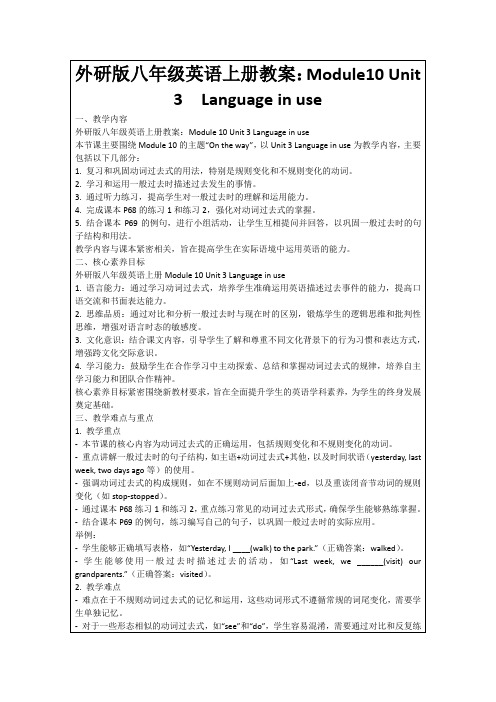
4.学习能力:鼓励学生在合作学习中主动探索、总结和掌握动词过去式的规律,培养自主学习能力和团队合作精神。
核心素养目标紧密围绕新教材要求,旨在全面提升学生的英语学科素养,为学生的终身发展奠定基础。
三、教学难点与重点
-通过课本P68练习1和练习2,重点练习常见的动词过去式形式,确保学生能够熟练掌握。
-结合课本P69的例句,练习编写自己的句子,以巩固一般过去时的实际应用。
举例:
-学生能够正确填写表格,如“Yesterday, I ____(walk) to the park.”(正确答案:walked)。
-学生能够使用一般过去时描述过去的活动,如“Last week, we ______(visit) our grandparents.”(正确答案:visited)。
课堂上,我尝试通过提问和案例分析的方式引导学生主动思考,这样的互动让学生们更积极地参与到学习中。例如,在讲解动词过去式时,我让学生们尝试造句,并及时给予反馈,帮助他们纠正错误,加深理解。
然而,我也注意到,部分学生在口语练习时仍然显得有些拘谨,可能是因为他们对过去时的运用还不够自信。在未来的教学中,我需要更多地关注这部分学生,鼓励他们大胆开口,增强他们的自信心。
此外,小组讨论环节,学生们表现得相当积极,能够围绕一般过去时的应用进行深入的探讨。但在成果分享时,我发现有些小组的展示还不够充分,可能是由于讨论时间分配不均或是对主题理解不够透彻。为此,我计划在下次活动中,更加明确讨论要求,并在讨论过程中给予适当的指导,以提高讨论效率。
在实践活动方面,写作练习让学生们能够将所学的知识应用到实际情境中,但我也发现有些学生在构思句子时仍存在困难。针对这一问题,我打算在接下来的课程中增加一些写作技巧的讲解,如如何运用时间状语、如何连接句子等,帮助学生提升写作能力。
外研版 八年级下册 英语 教案:Module10Unit 3 Language in use
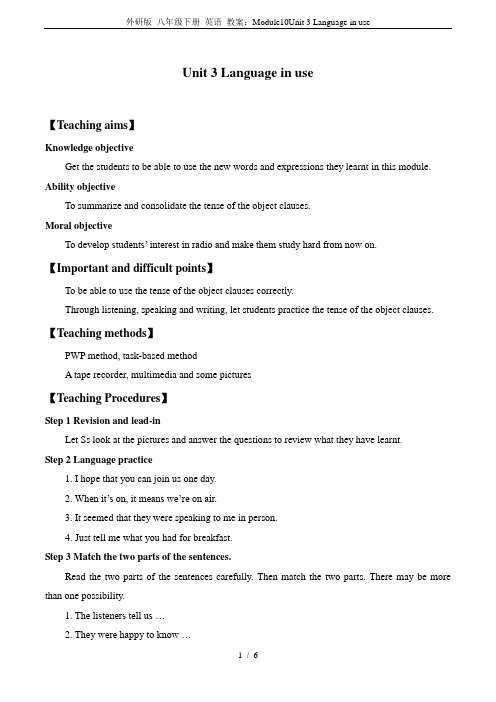
Unit 3 Language in use【Teaching aims】Knowledge objectiveGet the students to be able to use the new words and expressions they learnt in this module. Ability objectiveTo summarize and consolidate the tense of the object clauses.Moral objectiveTo dev elop students’ interest in radio and make them study hard from now on.【Important and difficult points】To be able to use the tense of the object clauses correctly.Through listening, speaking and writing, let students practice the tense of the object clauses. 【Teaching methods】PWP method, task-based methodA tape recorder, multimedia and some pictures【Teaching Procedures】Step 1 Revision and lead-inLet Ss look at the pictures and answer the questions to review what they have learnt.Step 2 Language practice1. I hope that you can join us one day.2. When it’s on, it means we’re on air.3. It seemed that they were speaking to me in person.4. Just tell me what you had for breakfast.Step 3 Match the two parts of the sentences.Read the two parts of the sentences carefully. Then match the two parts. There may be more than one possibility.1. The listeners tell us …2. They were happy to know …3. He asked …4. Did they know …?5. Have you heard …?a) When she came into this room.b) What they want to hear.c) That they won the first prize last week.d) That he will come?e) What he was doing at that time?Answers:1. The listeners tell us what they want to hear.2. They were happy to know that they won the first prize last week.3. He asked when she came into this room.4. Did they know that he will come/ what he was doing at that time?5. Have you heard that he will come/ what he was doing at that time?Step 4 Complete the conversation with the words in the box.1. Read the conversation carefully.2. Use the words in the box to fill in the blanks.how if that when who whyTony: Hello, everyone! Thanks for waiting-now I can tell you (1) ______ has won the English Writing Composition. It’s Ling ling! Lingling, tell us, (2) _____ do you feel?Lingling: Well, I feel great. I was quite surprised (3) ______ I heard (4) ______ I was the winner.Tony: I don’t know (5) _____ you were surprised. You’ve always been the best at writing in the school.Lingl ing: I don’t know about that! A l ot of other students are good at writing as well.Tony: But there’s only one winner. Well done, Lingling! What’s the prize?Lingl ing: It’s an electronic dictionary.Tony: Fantastic! And (6) ____ you want to read Lingl ing’s article, you can find it in the s chool magazine.Answers: who, how, when, that, why, ifStep 5 Read the conversation in Activity 2 again and complete Daming’s diary.a. Read the conversation in Activity 2 again.b. Then complete Daming’s diary.I have heard that Lingling (1) ________________________________. Tony said (2) _________________________ at the news in the beginning. I know (3) ______________ an electronic dictionary, and I think (4) _______ fantastic. I have decided (5) _________________________. Then maybe next time I will write an article for the competition.Answers:(1) Has won the English Writing Competition(2) Lingling was quite surprised(3) the prize is/was(4) It is(5) that I will practice my English writingStep 6 Complete the passage with the correct form of the expressions in the box1. Look through the passage and choose the right expressions.2. Draw the correct answers from each group.be on air in person make noise show you around the end ofI am going to (1) _________________ the radio station. When the red light is on, it means we(2) __________. You have to avoid (3) _____________. I know some of you would like to work in radio. I will introduce you to the presenters. They will talk to you (4) __________. This screen shows us what is happening in the world. The first programmer of the day starts at 5 am, and the station closes down at 12 pm. OK, that is (5) __________ the tour. Has anyone got any questions?Answers:(1) show you around (2) are on air (3) making noise(4) in person (5) the end ofStep 7 Listening1. Listen and say what Kate’s job is.a. A newspaper reporter.b. A radio presenter.c. A newsreader.2. Listen again and complete Kate’s timetable.10 am Kate _____ in a park.11 am ___________________________________4 pm The programme _______.In the first part of the shows, Kate __________ her guests.Then the __________ comes in. This takes about _____ minutes.After that is the ______________.Finally listeners _______the station and _______ Kate.7:30pm The programme _________.3. Now listen and number the pieces of advice in the order you hear them.Step 8 ReadingRead the interview in Part 7 and complete the notes.ExperiencesAt fifteen years old, Bernard started to (1) __________________.At seventeen years old, Bernard became the (2) __________ presenter of a teenage radio show.He has worked for a national radio station for (3) ______ years now.OpinionsTo become successful, you need to (4) _______________.It is also important to (5) ______________.Answers: present music shows, youngest, four, work hard, love your job,Step 9Around the worldTo learn about the clockwork radio.The clockwork radioTrevor Baylis, a British inventor, was listening to a radio programme about health problems in Africa one day. He then realized how much a radio could help African people learn about health and health care. Electricity and batteries are expensive and hard to get in some parts of Africa, so he developed a clever radio that works without batteries or electricity. The clockwork or wind-up radio, first made in South Africa in the 1990s, changed the lives of many African people. Even in tiny villages which had no electricity or other forms of communication, people began to listen to the radio,not only for entertainment, but to educate themselves too.Step 10 Writing1. Work in groups. Decide what to include in your school radio programme.2. Write each section of the programme.3. Do your school radio programme. Try to record it if possible.4. Present your radio programme to the rest of the class.Step 11 SummaryTo let Ss say what they have learnt.Step 12 ExercisesDo some exercises and draw the answers from the Ss.1. -- Can you tell me ______?-- She is in the computer labA. where Linda wasB. where is LindaC. where was LindaD. where Linda is2. -- Excuse me, could you tell me ________?-- Sorry, si r. I wasn’t there at that time.A. how did the accident happenB. how the accident happenedC. how does the accident happenD. how the accident happens3. —What did your teacher say this morning?— She told us _______.A. why was Tom late for school againB. whether we had too much homeworkC. how she did come to school this morningD. that we would have a test soon4. — Could you tell me ________?—They’re over there.A. where are the restroomsB. where were the restroomsC. where the restrooms areD. where the restrooms wereAnswers: DBBCStep 13 中考链接Do some exercises from the entrance exam to senior high schools.1. — I want to know _____.—Sorry. I’ve no idea. But she was here just now. 【2013广东湛江】A. where is AnnB. where Ann isC. where was AnnD. where Ann was2. — Hi, Bruce. Here is a letter for you.— Thanks. I wonder _______. 【2013山东滨州】A. who the letter was fromB. who was from the letterC. who was the letter fromD. who from the letter was3. —Could you tell me _______? I’m going to pick you up at the airport.— At 15:45 this Friday. 【2013浙江宁波】A. where you met meB. who you are coming withC. when you came hereD. what time you are arriving4. The woman asked the policeman where ________. 【2013山东潍坊】A. the post office isB. was the post officeC. is the post officeD. the post office wasAnswers: BADDStep 14 Homework写一篇作文,介绍你和校园广播之间的小故事。
外研版英语八年级(上)M10 Unit 3 Language in use-教案

教学设计外语教学与研究出版社《新标准》英语初中二年级上册Module Ten The weatherUnit Three It might snow.辽宁省大连市第三十九中学一、教材分析“天气”这个话题与人们的生活息息相关,是西方人特别是英国人在日常生活中经常谈论的。
本模块的内容由天气扩展到去一个地方旅游的最佳时间等内容,与学生的生活联系紧密。
模块分设三个课时进行学习,本节课是这个模块中的第三课时,是一节综合语用课。
本模块的任务为就到中国旅游的最佳时间提出建议,给朋友回复邮件。
本单元的重点是能够正确运用表示可能性的单词和句型描述天气。
难点为选择最佳时间来中国游玩并提出建议,使语言知识的学习融入生活实践,培养用语言做事的能力。
二、学情分析本课授课对象是八年级学生,他们活泼好动,有着丰富的想象力和好奇心,并且在本模块前两个单元的学习中已经积累了有关天气的词汇、询问并描述天气的句型以及表达可能性的词汇和语法内容。
有进一步学习的欲望,愿意通过小组合作学习的方式共同完成模块任务。
三、教学目标(一)语言知识目标1.复习词汇:cloud, cloudy, rain, rainy, sun, sunny, snow, snowy, wind, windy, storm, shower, minus, temperature, degree2. 语法:may, might, will probably 表可能性(二)技能目标1. 能够运用表达可能性的词汇和句型谈论、描述天气情况2. 能够就游览某地给出建议,并使用because ,so, but等说明原因和结论3. 能够帮助外国友人选择来中国游玩的最佳时间、陈述理由并给出相关的建议。
(三)学习策略目标1. 自学策略:能够理解并归纳表示可能性的单词和句型;掌握谈论天气情况的习惯表达方式。
2. 合作学习策略:能够在同学间积极运用所学英语就不同的天气情况进行表达和交流,选取到中国游玩的最佳时间并给出合理建议。
初中英语外研版八年级下册《Module10 Unit 3 Language in use peri

外研版八下Module 10 习题三一、根据句意及首字母提示完成句子1.They were p ________to cross the river when it began to rain.2.You can ask Tony.He s ________to know about it.3.Our class made a high s________ in the last test.4. He e________ to us why he didn't come yesterday just now.5.I am sure he will w________ the game.二、选择适合的选项( ) 1. ——Could you please tell me________?——By taking an online tour.A、in which way can I improve my writing skillsB、how I can travel around the world in eight hoursC、what places of interest we can visit at a timeD、how should I get some more useful information( ) 2. ——Why did you he get up so early to work?——In order to ________the heavy traffic in the city.A. avoidB. stopC. cancelD. solve ( ) 3. Mary kept on ________although she was tired.A. workB. workingC. workedD. to work ( ) 4. The fans were ________to know the death of their favourite singing star Whitney Huston.A. glad B.angry C.excited D. surprised ( ) 5. It is important ________people ________learn team spirit.A.of,of B. of,to C.for,to D.to,to三、用括号中所给单词的适当形式填空1.The final _______of the football match was three to four.2. She kept on_______ (play) the piano although she had played for two hours.3. Ms. Wang looked_______ (surprise) when she heard the surprising news.4. He_______(work)for the school radio station since two years ago.5. Thank you for_______ (listen) to my speech.四、句型转换1.Light travels faster than sound.My teacher told me.(改为含有宾语从句的复合句)My teacher told me________ light________ faster than sound.2. Are the children playing games? I want to know.(改为含有宾语从句的复合句)I want to know________ the children________ ________ games.3.It seems that he’s very polite. (改为同义句)________ seems ________ ________ very polite.4.You don’t need to take the raincoat. (改为同义句)You ________ ________ the raincoat.5.Let’s go to the park tomorrow, ________ ________? (完成反意疑问句)五补全对话(选择)A: Hi, Betty. Where did you go yesterday afternoon?B: Oh, 1 .A: Really? That sounds great. 2 .B: Yes. We learned a lot there.A: 3 .B: We met some famous newsreaders and reporters and then they showed us around Radio Beijing. A: Great! Did you go to the news room?B: Yes, we did. 4 . And we also spoke a piece of latest news like her.A: 5 .B: I want to try my best to study my subjects. I want to be a newsreader in the future.A. Did you have a good time there?B. A famous newsreader told us how to speak in the news room.C. Thank you for telling me.D. How did you feel after you visited Radio Beijing?E. I visited Radio Beijing with my classmates.F. What do you think of it?G. What did you do at Radio Beijing?参考答案:一、根据句意及首字母提示完成句子1.preparing2.seems3.score4. explained5.win二、选择适合的选项1——5:BABDC三、用括号中所给单词的适当形式填空1.result2.playing3. surprised4. has worked5. listening四、句型转换1.that,travels2.it/whether,are playing3.He;to;be4.needn’t;take5.shall;we。
八年级英语下册Module10Unit3Languageinuse教案外研版(2021年整理)
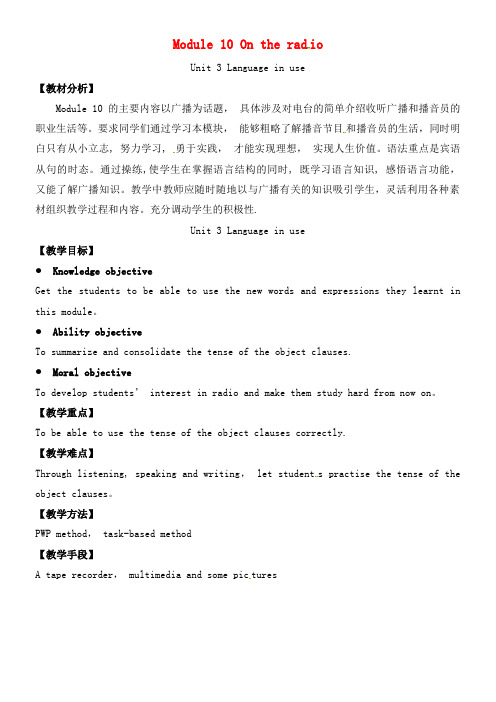
Module 10 On the rad ioUnit 3 Language in use【教材分析】Module 10的主要内容以广播为话题,具体涉及对电台的简单介绍收听广播和播音员的职业生活等。
要求同学们通过学习本模块,能够粗略了解播音节目和播音员的生活,同时明白只有从小立志, 努力学习, 勇于实践,才能实现理想,实现人生价值。
语法重点是宾语从句的时态。
通过操练,使学生在掌握语言结构的同时, 既学习语言知识, 感悟语言功能,又能了解广播知识。
教学中教师应随时随地以与广播有关的知识吸引学生,灵活利用各种素材组织教学过程和内容。
充分调动学生的积极性.Unit 3 Language in use【教学目标】●Knowledge objectiveGet the students to be able to use the new words and expressions they learnt in this module。
●Ability objectiveTo summarize and consolidate the tense of the object clauses.●Moral objectiveTo develop students’ interest in radio and make them study hard from now on。
【教学重点】To be able to use the tense of the object clauses correctly.【教学难点】Through listening, speaking and writing, let student s practise the tense of the object clauses。
【教学方法】PWP method, task-based method【教学手段】A tape recorder, multimedia and some pic tures【教学过程】Teaching Procedures:Activity 2 again and complete Daming’s diary in Activity 3。
- 1、下载文档前请自行甄别文档内容的完整性,平台不提供额外的编辑、内容补充、找答案等附加服务。
- 2、"仅部分预览"的文档,不可在线预览部分如存在完整性等问题,可反馈申请退款(可完整预览的文档不适用该条件!)。
- 3、如文档侵犯您的权益,请联系客服反馈,我们会尽快为您处理(人工客服工作时间:9:00-18:30)。
《M10 Unit3 Language in use (2)》学习任务单
【学习目标】
1.通过选词填空、听力练习巩固本单元相关话题、词汇和短语。
2.通过短文阅读,了解电台采访的主要形式和内容。
3.学习《Around the world 》了解更多有关radio 的历史知识。
【课前预习任务】
1. 复习Unit1&2的相关话题和词汇短语。
2. 预习本单元的课文和词汇。
【课上学习任务】
1. 完成Exercise 4、5、6 并核对答案。
4. 阅读around the world 文段,根据课文内容连线,完成句子。
【课后作业】
制作一期校园广播节目,选择你感兴趣的栏目,写一写广播稿。
在家里广播给家人听。
也可以录制成音频,分享给家人和朋友们。
【课后作业参考答案】
略。
